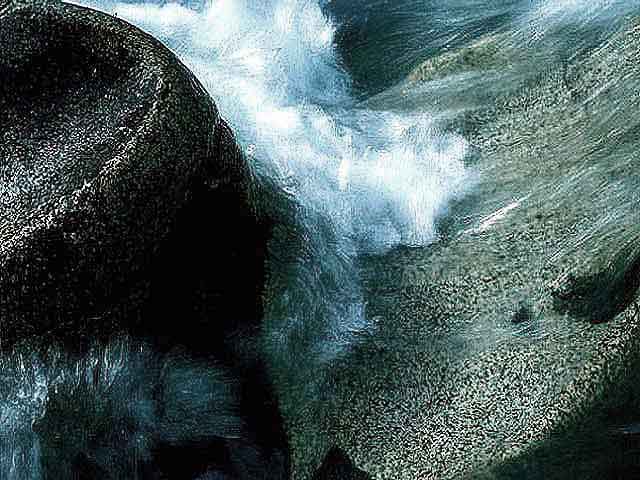
in the world,
without reason dies in the world:
looks at me."
from the The Book of Images,
by Rainer Maria Rilke
This week, an image of Glacier
Water on Granite. Also: new
translations from the German.
December: Clear Water, Smooth Granite and the Flow of Compassion
The Flow of Compassion
Pondering the photograph above, one thing which might be said about water in
flowing movement is that, like the air we breathe, it belongs to no one. Water is
truly in some sense of the whole, and not of any isolated fragment thereof. We
may build dams in the course of its flow, we may pollute it, waste it, but we can
not in a fundamental way impede its timeless journey throughout the lifebody
of the Earth.
So, in a way, pondering water prepares the mind to consider the nature of natural
borders generally, and in this particular context, the borders—real or imagined—
which we sense or perceive between each other. Our theme is compassion. Compassion
in the sense that I see myself in the other, that the other's suffering is also in some,
inescapably profound sense, my own. This means that the borders between myself
and, say, the homeless man on the street, or a people ravaged by poverty and disease,
or yes, also the destruction of a watershed, are not as sharply drawn and as rigid as
we as a culture have come to assume.
The two poems I've brought together here from Rilke's The Book of Images
(circa 1905) are both exceptional in this sense because they imply a new way of see-
ing the world in which these divisions are questioned. They point to something like
an incipient compassion in the sense I am using the word here. Without going into
the biographical considerations which Rilke scholars frequently cite in reference to
these works, especially the famous collection called The Voices: Nine Poems
with a Title Page, from which I've included the signature piece, the point I would like
to bring out here is that the poet himself has become a kind of sounding board for the
voices of others. How different this is from the generally exceedingly narrow scope
of much English poetry of the current era. And this, despite the fact that these pieces
are now almost 100 years old, makes them in my view as challenging and as relevant
today as the moment they were first composed:
|
Ernste Stunde Wer jetzt weint irgendwo in der Welt, ohne Grund weint in der Welt, weint über mich. Wer jetzt lacht irgendwo in der Nacht, ohne Grund lacht in der Nacht, lacht mich aus. Wer jetzt geht irgendwo in der Welt, ohne Grund geht in de Welt, geht zu mir. Wer jetzt stirbt irgendwo in der Welt, ohne Grund stirbt in der Welt: sieht mich an. |
Solemn Hour Whoever cries now somewhere in the world, without reason cries in the world, cries about me. Whoever laughs now somewhere in the night, without reason laughs in the night, laughs at me. Whoever goes now somewhere in the world, without reason goes in the world, comes to me. Whoever dies now somewhere in the world, without reason dies in the world: looks at me. |
| Titleblatt Die Reichen und Glücklichen haben gut schweigen, niemand will wissen, was sie sind. Aber die Dürftigen müßen sich zeigen, müßen sagen: ich bin blind, oder: ich bin im Begriff es zu werden oder: es geht mir nicht gut auf Erden, oder: ich habe ein krankes Kind, oder: da bin ich zusammengefügt . . . Und vielleicht, daß das gar nicht genügt. Und weil alle sonst, wie an Dingen, Und da hört man noch guten Gesang. Freilich die Menchen sind seltsam; sie hören Aber Gott selber kommt und bleibt lang, Rainer Maria Rilke |
Title Page It's easy for the rich and fortunate to remain silent, nobody wants to know who they are. That is why the destitute must show themselves, must say: I am blind, or: that is what I'm about to become, or: it's not going very well with me here on Earth, or: I have a sick child, or: this is where I'm kind of all stuck together . . . And perhaps even that is not enough. Despite everything, as if they were things, people walk right by, and so they must sing. And one hears good music there. Truly, people are strange; They'd rather hear castrati in boys' choirs. But God himself comes and remains a long time when these disfigured ones begin to disturb him. (all tr. Cliff Crego) | go to the whole of The Voices: Nine Poems with a Title Page, translated by Cliff Crego | |

| view / print Picture/Poem Poster: Solemn Hour (86 K) |
| see also the Rilke Posters |
| listen to other recordings in English and German of twelve poems from
The Book of Images at The Rilke Download Page (# Includes instructions) |
See also other recent additions of new English translations of Rilke's poetry, together with
featured photographs at:
(19) November: More Figures from Interior Space
(18) November: Figures from Interior Space

|
See also another website by Cliff Crego: The Poetry of Rainer Maria Rilke |
a presentation of 80 of the best poems of Rilke in both German and new English translations: biography, links, posters |
|
See also: new |
|
"Straight roads, Slow rivers, Deep clay." |
A collection of contemporary Dutch poetry in English translation, with commentary and photographs by Cliff Crego |